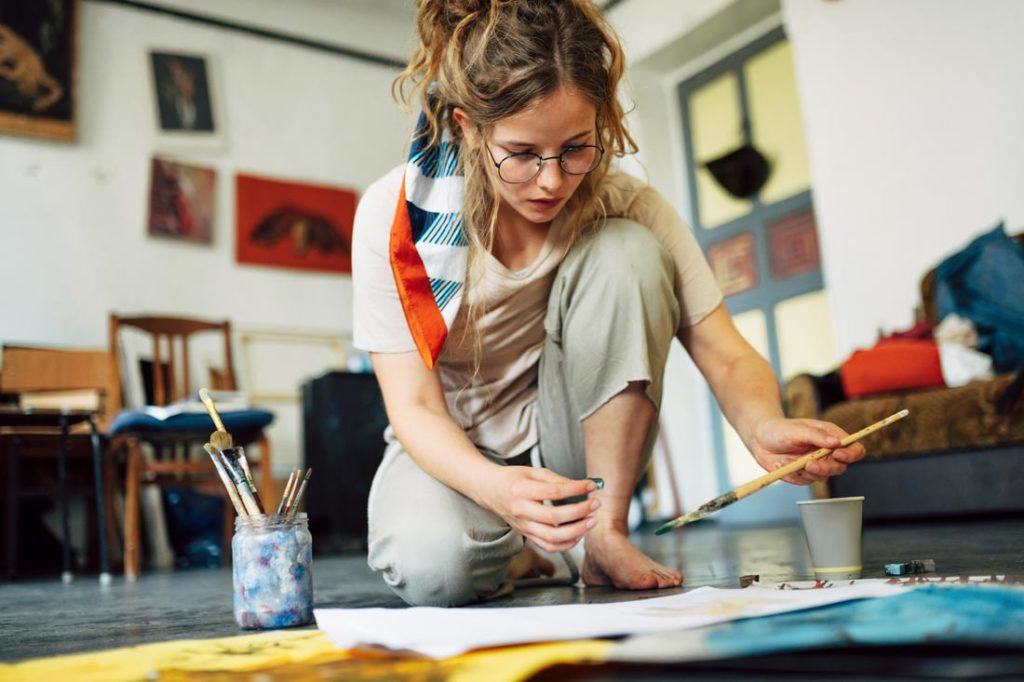So you think you’re creative? We’re going to guess you do.
In an informal poll, we asked friends, family members and neighbors the same question, and the results were unanimous:
A retired accountant: yes.
The barista at a favorite local coffee shop: yes.
A neuroscience researcher: yes.
A dog walker: yes.
The across-the-hall neighbor, a photographer and a stay-at-home parent: yes.
We can’t possibly all be creative, though, right?
Actually we can. Creativity was once considered to be the exclusive dominion of eccentric geniuses such as Albert Einstein, Vincent van Gogh and Steve Jobs. But recent research shows manifold traits—including intelligence, personality traits such as openness to experience and curiosity—affect creativity.
Being creative and neuroscience
In Wired to Create: Unraveling the Mysteries of the Creative Mind, co-author Scott Barry Kaufman, Ph.D., makes the case that everyone’s brains are capable of profound creativity. But knowing how or why is a sticky, tricky business. That’s because not only are there many facets to creativity, he says, but so many of them are at odds with each other. “Creatives” are not only artistic and imaginative; they are, for example, analytical and task-oriented, too. Creativity checks lots of (seemingly contradictory) boxes.
Neuroscience has been so effective at mapping which parts of the brain are involved with which cognitive functions. But it has only added to the confusion when it comes to creativity. The fight-or-flight response, for example, originates in the amygdala. The hippocampus facilitates the creation and storage of long-term memories. But for those engaged in creative tasks and in the process of refining their work or collaborating with others to make further progress, a number of brain regions support creative ability.
No one brain region or hemisphere—as the myth of the right-brained artist would have us believe—can lay claim to creativity, Kaufman says. He calls the creative brain a “messy brain” because it activates so many intellectual and emotional capacities, making it hard to tease apart one common characteristic that signals creativity.
Questions to discover your creative side
From a practical standpoint, the diversity of experience involved in creativity makes it a difficult concept to study. After all, how do you measure? Is the metric based on how many new ideas you can come up with? On how you dress, what music you listen to and with whom you strike up conversations? On the number of screenplays you’ve written, products you’ve developed or paintings you’ve sold? Or simply on how creative you feel yourself to be?
Along with Martin Seligman, Ph.D., the “father of positive psychology,” Kaufman established the Imagination Institute, part of the Positive Psychology Center at the University of Pennsylvania, to answer these questions. They’ve found that despite the untidiness of the creative brain, a few elements brand us all as creative human beings. Ask yourself these four questions to determine what makes you imaginative, innovative and resourceful.
1. Are you divergent?
For years, creativity research has primarily revolved around the assessment of one aspect of imagination: divergent thinking, the ability to formulate multiple solutions to a problem. To measure divergent thinking, scientists might ask their study participants to come up with as many novel, feasible uses as possible for a common object such as a paper clip, brick or cup. Depending on their answers (a bubble wand! a paperweight! a flower vase!), the subjects were deemed creative or not. But more recent studies have found that divergent thinking is not the only, or even primary, measure of creativity. In fact, its cognitive opposite, convergent thinking—following logical steps to determine a solution—is just as important. After all, you need to be able to think convergently to pick the best of all of your quite possibly harebrained divergent ideas and see it through.
One 2015 study from Northwestern University found that, in regards to sensory processing as a predictor of creative achievement, divergent thinking did not correlate with real-world creative success. “People who perform really well on divergent thinking tests aren’t necessarily creative achievers,” says Darya Zabelina, Ph.D., the lead author of the study. That is, even the folks who couldn’t think of anything to do with the paper clip besides holding papers together were just as likely to write and direct a successful play as the people who had loads of MacGyver-type tricks for the humble office-supply staple. Divergent thinking doesn’t always predict creativity.
But it still counts. Psychologists rely on something called the Big Five personality traits—extraversion, agreeableness, conscientiousness, neuroticism and openness to experience/intellect—when evaluating basic personality types as they relate to the world. That last one, openness to experience/intellect, is the one most consistently associated with creativity. But the two sides of the trait, taken separately, predict different types of creative vision. Research by Kaufman and his colleagues found that higher openness to intellect scores were associated with creative achievement in the sciences and higher openness to experience scores were associated with artistic creativity.
Here’s where divergent thinking comes back into play: Divergence is indicative of the fluid reasoning involved with the intellect side of the coin. If you lean toward openness to intellect, you may not be the stereotypical creative type. Maybe you don’t write poetry in your spare time or tinker with the guitar, but you solve problems in elegant, effective ways that drive advancements in your field. These novel solutions are a hallmark of your creativity.
It’s not just our professional lives, though, where unlocking your creativity matters. Relationships involve inventive problem-solving at every turn, for example, as does the management of our own emotional well-being. Do you want to keep reacting to your father with anger, or do you want to find a new way of getting past old resentments and see things differently? It takes creativity to change our mindsets. And that may be why studies have shown that creative people are generally happier and more positive.
2. Are you open?
The Imagination Institute’s research found that people who score high on openness to experience—that is, the degree to which one is willing to engage with novel experiences for their own sake—are much more likely to possess artistic creativity.
“People who are high in openness might enjoy traveling to new places, eating foods they’ve never eaten before and discussing ideas they’re unfamiliar with,” says Marie Forgeard, Ph.D., lead scientific consultant for the Imagination Institute. In short, they’re curious, and it pays off in enhanced creativity. “When we diversify our experiences, we’re more likely to come up with new ideas or ways of looking at the world,” Forgeard says. “We can find the connections between things that most people would not think to connect.” You may hear a new song, for example, that reminds you of that book you read that the guy you met on the train recommended. He was from Japan and that makes you wonder whether the cherry blossoms have bloomed there and what climate change factors could be influencing the unseasonable weather. Suddenly you feel the inspiration to write, cook or rearrange your living room.
For some, these cognitive connections may happen whether they want them to or not. In a 2015 study published in Memory & Cognition, Zabelina explored how patterns of attention may influence creativity. She contrasted “flexible” attention (avoiding sensory distraction) with “leaky” attention (paying attention to sensory distractions). If your attention is leaky, the beeping horn from outside the window and the light coming from the bathroom will all distract you from, say, getting your tax return done or finishing that email to your partner. While many people’s brains tune out the sensory information that isn’t relevant to the job at hand, leaky brains let it all in without any filtering. And while this can make checking items off a to-do list trying, Zabelina’s work shows that it also promotes creativity. In her study, the participants with the highest number of “real-world creative achievements”—specifically artistic achievements—were more prone to leaky attention.
“It’s a double-edged sword because people with leaky attention can be easily overwhelmed, but they’re also more creative,” Zabelina says. “They are sensitive to the environment they’re in as well as their internal, emotional environment. They don’t disregard things as irrelevant. They notice things and make connections between all the stimuli they’re experiencing.” With more information coming in, folks with leaky attention seem to be more readily inspired. (Divergent thinkers, it’s interesting to note, aced the concentration test.)
Does this mean that people with attention deficit disorders are creative geniuses? It’s possible, Zabelina says, but there has to be a balance. “You have to be an astute observer,” she says, “but you also have to be able to sit down and write that book or build the invention you just thought of.” Leaky creatives have to learn tricks to harness their observational inspiration without being inundated by it. To do so, Michael DeVine, owner of Michael DeVine Counseling & Coaching in Dublin, Ohio, suggests practicing mindfulness. By training yourself to notice what’s going on around and within you at the present moment, without getting caught up in it, you can actually focus better, he says. “Creative people need to feel centered before they can reach their peak performance.”
3. Are you motivated?
Is creativity worth anything without the achievements to show for it? You can make all the connections you want in your head. But unless you put pen to paper, your creativity is contained, self-serving. And that’s fine, many psychologists say. Your self-perception of your own creativity can still improve your sense of well-being.
People who are very “open to experience cognitively engage with perception, fantasy, aesthetics and emotion,” Kaufman says. In other words, pondering, fantasizing and introspecting can constitute the creative life for many. While some people may be more predisposed to imaginative thinking, Forgeard says “not all of them are motivated to develop this ability and dedicate themselves to a creative mission.” Which is why highly creative achievers aren’t always the dreamy types we picture. Creative achievement requires executive function skills—the opposite of leaky attention, one of the many contradictions that makes creativity so messy, Kaufman says.
Motivation may be circumstantial, though, depending on your creative role models and the opportunities and experiences you’ve had, Forgeard says. If you were encouraged to explore your ideas and try new things as a child, for example, you might be more likely and unafraid to pursue your creativity than someone who wasn’t. If you find that motivation is your sticking point, join a writers’ group, acting class or small-business club. Being around like-minded people can give you the support and structure you need to attain creative goals.
Finally, studies show that both intrinsic motivation—the motivation to do something out of your own interest and pleasure—and extrinsic motivation—that is, being motivated by an external reward or because you want to meet a perceived expectation—can benefit creativity. Specifically, “recognition and social rewards” can have a positive effect on intrinsic motivation and creativity, allowing both forms of motivation to work in tandem.
4. Are you collaborative?
The chaotic nature of creativity is why Mark Prommel, partner and design lead at Pensa, an award-winning design and engineering firm in New York City, believes in teamwork. “We put people together from different backgrounds [engineering, design, art, business] because we need all kinds of brains thinking about a problem,” Prommel says. “We don’t separate our teams into creative and noncreative people because everyone has a different type of creativity, and they’re all needed to complete a project. Being open to other ideas and collaboration is so important.”
Even if you’re not on a team, cultivating creativity relies on inner collaboration. Remember: Creativity is a whole-brain activity. Recognize what your creative strengths are and then work on amplifying the others. If you’re a divergent thinker, you may want to work on observing the world around you and allowing yourself to be inspired by what you find. If you’re already the curious, sensitive type, you might need help making the most of your wandering mind. And if you’re highly motivated and organized, find a creative endeavor you feel really passionate about.
But the truth is, we all possess more than one of the aspects of creativity. In Wired to Create, Kaufman quotes Walt Whitman: “Do I contradict myself? Very well, then I contradict myself, (I am large, I contain multitudes.)”
You, too, contain multitudes. It’s what makes you so darn creative.
This article originally appeared in the July 2016 issue of SUCCESS magazine and has been updated. Photo by Yuricazac/Shutterstock










